-
 Fr. Flavian Burns, O.C.S.O., Presentation on Dan Walsh, August 28, 1976.
Fr. Flavian Burns, O.C.S.O., Presentation on Dan Walsh, August 28, 1976.
-
 In Commemoration of Thomas Merton's 60th Birthday, January 31, 1975.
In Commemoration of Thomas Merton's 60th Birthday, January 31, 1975.
-
 John Howard Griffin, Question and Answer session for "The Meaning of Thomas Merton," Oberlin College, Ohio, recorded November 13, 1972, Merton Festival of Northern Ohio.
John Howard Griffin, Question and Answer session for "The Meaning of Thomas Merton," Oberlin College, Ohio, recorded November 13, 1972, Merton Festival of Northern Ohio.
-
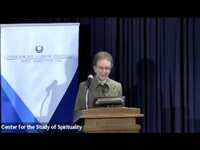 Ilia Delio - Merton's Christophany and the Second Axial Monk. Presented as the inaugural 4th and Walnut lecture held at Saint Mary's College and for simultaneously streamed for the Tuesdays with Merton Series, November 14, 2023.
Ilia Delio - Merton's Christophany and the Second Axial Monk. Presented as the inaugural 4th and Walnut lecture held at Saint Mary's College and for simultaneously streamed for the Tuesdays with Merton Series, November 14, 2023. Thomas Merton’s epiphany on the corner of Fourth and Walnut Streets was a significant breakthrough into Christ consciousness and the opening up of what Raimon Panikkar calls, “Christophany.” This new consciousness propelled an inversion of Merton’s monastic life toward ever deepening relationships with a world of complexity. Relying on insights from Carl Jung, Raimon Panikkar and Teilhard de Chardin, I will explore Merton’s Christophany as a radical theology, a mutational disruption of the Neoplatonic quest, and the ushering in of a new monastic consciousness reflective of the second axial age, marked by the hyperpersonal monk of planetary consciousness.
Ilia Delio, OSF, PhD is a Franciscan Sister of Washington, DC and American theologian specializing in the area of science and religion, with interests in evolution, physics and neuroscience and the import of these for theology.
Ilia currently holds the Josephine C. Connelly Endowed Chair in Theology at Villanova University, and is the author of twenty books including Care for Creation (coauthored with Keith Warner and Pamela Woods), The Emergent Christ and The Unbearable Wholeness of Being: God, Evolution and the Power of Love (Orbis, 2013).
-
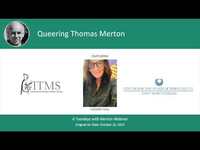 Cassidy Hall - Queering Thomas Merton. Presented for the Tuesdays with Merton Series, October 10, 2023.
Cassidy Hall - Queering Thomas Merton. Presented for the Tuesdays with Merton Series, October 10, 2023. What Would it Look Like to Queer Thomas Merton? What is queer theory and queer theology and how can they be used as a lens to better understand Merton—and ourselves? In our time together, Cassidy, a cis queer white woman, will examine the ways the traditional western Christian contemplative canon has left out far too many voices from the conversation. She will share a part of her own contemplative journey which led her to traveling to all 17 Trappist Monasteries of the US, Directing a film about Thomas Merton’s hermitage years, and writing the forthcoming book Queering Contemplation: Finding Queerness in the Roots and Future of Contemplative Spirituality.
Cassidy S. Hall (She/Her), MA, MDIV, MTS, is an author, award-winning filmmaker, podcaster, and leading voice in contemplative spirituality. She is the cohost of the Encountering Silence podcast and the creator of the Contemplating Now and Queering Contemplation podcasts. Her films include In Pursuit of Silence and Day of a Stranger. Cassidy is widely published and currently resides in Indianapolis, where she is studying for her DMin degree.
-
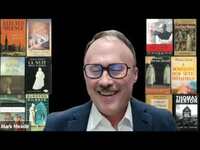 Mark C. Meade - The Seven Storey Mountain at Seventy-Five: Classic or Déclassé? Presented for the Tuesdays with Merton Series, September 12, 2023.
Mark C. Meade - The Seven Storey Mountain at Seventy-Five: Classic or Déclassé? Presented for the Tuesdays with Merton Series, September 12, 2023. The Seven Storey Mountain has reached another milestone. How has Merton’s autobiography fared in the first quarter of the 21st century? Since the book’s fiftieth anniversary, the Catholic Church has had three contrasting papacies and undergone severely damaging scandals of clergy sexual abuse. The Catholic Church in the United States, in line with other Christian denominations, has suffered declining church membership further fueled by a pandemic break in in-person attendance. Are Merton’s words now less central to the American religious experience, or does his story of spiritual longing resonate with people of our time in the U.S. and the world.
Mark C. Meade is the Assistant Director of the Thomas Merton Center at Bellarmine University in Louisville, KY. The year 2023 marks his 20th year at the Merton Center. He is a past president of the International Thomas Merton Society. He has presented and published on Merton in the United States and abroad on topics including Merton’s correspondence with Victoria Ocampo, Merton and existentialist themes, and Merton and Albert Camus on opposition to the death penalty.
-
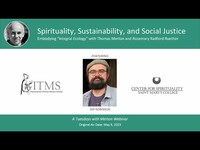 Jim Robinson - Spirituality, Sustainability, and Social Justice: Embodying "Integral Ecology" with Thomas Merton and Rosemary Radford Ruether. Presented for the Tuesdays with Merton Series, May 9, 2023.
Jim Robinson - Spirituality, Sustainability, and Social Justice: Embodying "Integral Ecology" with Thomas Merton and Rosemary Radford Ruether. Presented for the Tuesdays with Merton Series, May 9, 2023. From August 12, 1966 through February 18, 1968, Thomas Merton and Rosemary Radford Ruether engaged in a vibrant exchange of nearly 40 letters. In this talk, Robinson builds on this existing exchange by placing passages from Merton’s and Ruether’s broader bodies of work into conversation. He specifically lifts up insights from Merton and Ruether that can aid us in imagining and incarnating sustainable lives, communities, and societies that are grounded in spirituality and committed to social justice. In the process, he considers the links between Merton’s insights, Ruether’s insights, and Pope Francis’s promotion of an “integral ecology.”
Jim Robinson is a member of the Religious Studies Department at Iona University, where he serves as Director of the Thomas Merton Contemplative Initiative and Associate Director of the Deignan Institute for Earth and Spirit. He received his PhD in Theology from Fordham University, his MTS from Harvard Divinity School, and his BA from Drew University. He is a recent ITMS Shannon Fellow and a GreenFaith Fellow. He is actively involved in a number of lay Catholic communities committed to embodying spirituality, ecology, and social justice, including Agape Community in Hardwick, MA, and Benincasa Community in Guilford, CT.
-
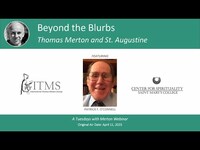 Patrick F. O'Connell - Beyond the Blurbs: Thomas Merton and St. Augustine. Presented for the Tuesdays with Merton Series, April 11, 2023.
Patrick F. O'Connell - Beyond the Blurbs: Thomas Merton and St. Augustine. Presented for the Tuesdays with Merton Series, April 11, 2023. Merton's name was associated with Augustine’s from the moment his autobiography appeared with comparisons to the Confessions on its cover. This presentation considers Merton’s ongoing interactions with Augustine in published works, journals and conferences: his reliance on Augustinian distinctions between cupidity and charity, science and wisdom; his measured evaluation of Augustinian mystical teaching and formulation of just war theory; his appreciative novitiate classes on De Doctrina Christiana; to his hermitage reflections on Camus’ university thesis on Augustine. This topic provides a fascinating and illuminating window on the development of various aspects of Merton’s own spirituality.
Patrick F. O'Connell is a founding member and former president of the International Thomas Merton Society, edits the ITMS quarterly publication The Merton Seasonal and is co-author with Christine M. Bochen and William H. Shannon of The Thomas Merton Encyclopedia (Orbis, 2002). He has edited twelve volumes of Thomas Merton’s monastic conferences, most recently Liturgical Feasts and Seasons (Cascade, 2022), as well as Merton’s Selected Essays (Orbis, 2012), Early Essays, 1947-1952 (Cistercian, 2015) and Cistercian Fathers and Forefathers (New City, 2018), as well as Merton & Confucianism (Fons Vitae, 2021). He is professor emeritus at Gannon University, Erie, PA.
-
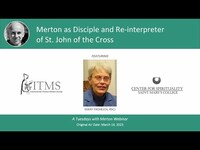 Mary Frohlich, RSCJ - Merton as Disciple and Re-interpreter of St. John of the Cross. Presented for the Tuesdays with Merton Series, March 14, 2023.
Mary Frohlich, RSCJ - Merton as Disciple and Re-interpreter of St. John of the Cross. Presented for the Tuesdays with Merton Series, March 14, 2023. When Young Thomas Merton first awakened to prayer during his student years at Columbia University, he turned to the writings of St. John of the Cross for contemplative wisdom. Near the end of his life when Merton summed up his teaching on prayer in his book Contemplative Prayer, John of the Cross appeared again as one of his most important sources. This presentation examines how Merton based his approach strongly upon some aspects of John's teaching while creatively weaving it together with a vast array of other sources.
Mary Frohlich, RSCJ, is a Professor Emerita at Catholic Theological Union in Chicago after teaching there from 1993 to 2020. She is a noted scholar of Carmelite spirituality, with numerous published essays on Teresa of Avila, Thérèse of Lisieux, and John of the Cross as well as on broader issues in the tradition. Her book Breathed into Wholeness: Catholicity and Life in the Spirit was published by Orbis in 2019, and she is currently working on another to be entitled The Heart at the Heart of the World. She now resides in Cambridge, MA, and focuses primarily on ecospiritual issues.
-
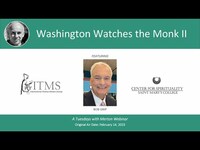 Bob Grip - Washington Watches the Monk II: Did the U.S. government monitor the actions of Thomas Merton? Presented for the Tuesdays with Merton Series, February 14, 2023.
Bob Grip - Washington Watches the Monk II: Did the U.S. government monitor the actions of Thomas Merton? Presented for the Tuesdays with Merton Series, February 14, 2023. Washington Watches the Monk II is a sequel to Bob Grip’s essay in The Merton Seasonal (available at: https://merton.org/ITMS/Seasonal/11/11-1Grip.pdf) revealing U.S. government files about Thomas Merton. Drawing on his decades as a journalist, Grip filed Freedom of Information Act requests to various agencies to explore the federal government’s archives. He discovered everything from routine records to evidence of illegal surveillance, which he will illustrate. This session will also include comment from a Pulitzer Prize winning journalist on the surveillance of private citizens.
Bob Grip devoted his entire professional life to journalism, most of it on the air in television news, including reports from the U.S. Gulf Coast to the Middle East to Europe including a meeting with Pope (and now Saint) John Paul II. He also taught multimedia journalism for 25 years at Spring Hill College in Mobile, Alabama. Grip earned his bachelor’s degree from Boston College and a master’s degree in Journalism from The Ohio State University. He is a former board member, treasurer and President of the International Thomas Merton Society.
 Fr. Flavian Burns, O.C.S.O., Presentation on Dan Walsh, August 28, 1976.
Fr. Flavian Burns, O.C.S.O., Presentation on Dan Walsh, August 28, 1976.  In Commemoration of Thomas Merton's 60th Birthday, January 31, 1975.
In Commemoration of Thomas Merton's 60th Birthday, January 31, 1975.  John Howard Griffin, Question and Answer session for "The Meaning of Thomas Merton," Oberlin College, Ohio, recorded November 13, 1972, Merton Festival of Northern Ohio.
John Howard Griffin, Question and Answer session for "The Meaning of Thomas Merton," Oberlin College, Ohio, recorded November 13, 1972, Merton Festival of Northern Ohio.  Ilia Delio - Merton's Christophany and the Second Axial Monk. Presented as the inaugural 4th and Walnut lecture held at Saint Mary's College and for simultaneously streamed for the Tuesdays with Merton Series, November 14, 2023. Thomas Merton’s epiphany on the corner of Fourth and Walnut Streets was a significant breakthrough into Christ consciousness and the opening up of what Raimon Panikkar calls, “Christophany.” This new consciousness propelled an inversion of Merton’s monastic life toward ever deepening relationships with a world of complexity. Relying on insights from Carl Jung, Raimon Panikkar and Teilhard de Chardin, I will explore Merton’s Christophany as a radical theology, a mutational disruption of the Neoplatonic quest, and the ushering in of a new monastic consciousness reflective of the second axial age, marked by the hyperpersonal monk of planetary consciousness. Ilia Delio, OSF, PhD is a Franciscan Sister of Washington, DC and American theologian specializing in the area of science and religion, with interests in evolution, physics and neuroscience and the import of these for theology. Ilia currently holds the Josephine C. Connelly Endowed Chair in Theology at Villanova University, and is the author of twenty books including Care for Creation (coauthored with Keith Warner and Pamela Woods), The Emergent Christ and The Unbearable Wholeness of Being: God, Evolution and the Power of Love (Orbis, 2013).
Ilia Delio - Merton's Christophany and the Second Axial Monk. Presented as the inaugural 4th and Walnut lecture held at Saint Mary's College and for simultaneously streamed for the Tuesdays with Merton Series, November 14, 2023. Thomas Merton’s epiphany on the corner of Fourth and Walnut Streets was a significant breakthrough into Christ consciousness and the opening up of what Raimon Panikkar calls, “Christophany.” This new consciousness propelled an inversion of Merton’s monastic life toward ever deepening relationships with a world of complexity. Relying on insights from Carl Jung, Raimon Panikkar and Teilhard de Chardin, I will explore Merton’s Christophany as a radical theology, a mutational disruption of the Neoplatonic quest, and the ushering in of a new monastic consciousness reflective of the second axial age, marked by the hyperpersonal monk of planetary consciousness. Ilia Delio, OSF, PhD is a Franciscan Sister of Washington, DC and American theologian specializing in the area of science and religion, with interests in evolution, physics and neuroscience and the import of these for theology. Ilia currently holds the Josephine C. Connelly Endowed Chair in Theology at Villanova University, and is the author of twenty books including Care for Creation (coauthored with Keith Warner and Pamela Woods), The Emergent Christ and The Unbearable Wholeness of Being: God, Evolution and the Power of Love (Orbis, 2013). Cassidy Hall - Queering Thomas Merton. Presented for the Tuesdays with Merton Series, October 10, 2023. What Would it Look Like to Queer Thomas Merton? What is queer theory and queer theology and how can they be used as a lens to better understand Merton—and ourselves? In our time together, Cassidy, a cis queer white woman, will examine the ways the traditional western Christian contemplative canon has left out far too many voices from the conversation. She will share a part of her own contemplative journey which led her to traveling to all 17 Trappist Monasteries of the US, Directing a film about Thomas Merton’s hermitage years, and writing the forthcoming book Queering Contemplation: Finding Queerness in the Roots and Future of Contemplative Spirituality. Cassidy S. Hall (She/Her), MA, MDIV, MTS, is an author, award-winning filmmaker, podcaster, and leading voice in contemplative spirituality. She is the cohost of the Encountering Silence podcast and the creator of the Contemplating Now and Queering Contemplation podcasts. Her films include In Pursuit of Silence and Day of a Stranger. Cassidy is widely published and currently resides in Indianapolis, where she is studying for her DMin degree.
Cassidy Hall - Queering Thomas Merton. Presented for the Tuesdays with Merton Series, October 10, 2023. What Would it Look Like to Queer Thomas Merton? What is queer theory and queer theology and how can they be used as a lens to better understand Merton—and ourselves? In our time together, Cassidy, a cis queer white woman, will examine the ways the traditional western Christian contemplative canon has left out far too many voices from the conversation. She will share a part of her own contemplative journey which led her to traveling to all 17 Trappist Monasteries of the US, Directing a film about Thomas Merton’s hermitage years, and writing the forthcoming book Queering Contemplation: Finding Queerness in the Roots and Future of Contemplative Spirituality. Cassidy S. Hall (She/Her), MA, MDIV, MTS, is an author, award-winning filmmaker, podcaster, and leading voice in contemplative spirituality. She is the cohost of the Encountering Silence podcast and the creator of the Contemplating Now and Queering Contemplation podcasts. Her films include In Pursuit of Silence and Day of a Stranger. Cassidy is widely published and currently resides in Indianapolis, where she is studying for her DMin degree. Mark C. Meade - The Seven Storey Mountain at Seventy-Five: Classic or Déclassé? Presented for the Tuesdays with Merton Series, September 12, 2023. The Seven Storey Mountain has reached another milestone. How has Merton’s autobiography fared in the first quarter of the 21st century? Since the book’s fiftieth anniversary, the Catholic Church has had three contrasting papacies and undergone severely damaging scandals of clergy sexual abuse. The Catholic Church in the United States, in line with other Christian denominations, has suffered declining church membership further fueled by a pandemic break in in-person attendance. Are Merton’s words now less central to the American religious experience, or does his story of spiritual longing resonate with people of our time in the U.S. and the world. Mark C. Meade is the Assistant Director of the Thomas Merton Center at Bellarmine University in Louisville, KY. The year 2023 marks his 20th year at the Merton Center. He is a past president of the International Thomas Merton Society. He has presented and published on Merton in the United States and abroad on topics including Merton’s correspondence with Victoria Ocampo, Merton and existentialist themes, and Merton and Albert Camus on opposition to the death penalty.
Mark C. Meade - The Seven Storey Mountain at Seventy-Five: Classic or Déclassé? Presented for the Tuesdays with Merton Series, September 12, 2023. The Seven Storey Mountain has reached another milestone. How has Merton’s autobiography fared in the first quarter of the 21st century? Since the book’s fiftieth anniversary, the Catholic Church has had three contrasting papacies and undergone severely damaging scandals of clergy sexual abuse. The Catholic Church in the United States, in line with other Christian denominations, has suffered declining church membership further fueled by a pandemic break in in-person attendance. Are Merton’s words now less central to the American religious experience, or does his story of spiritual longing resonate with people of our time in the U.S. and the world. Mark C. Meade is the Assistant Director of the Thomas Merton Center at Bellarmine University in Louisville, KY. The year 2023 marks his 20th year at the Merton Center. He is a past president of the International Thomas Merton Society. He has presented and published on Merton in the United States and abroad on topics including Merton’s correspondence with Victoria Ocampo, Merton and existentialist themes, and Merton and Albert Camus on opposition to the death penalty. Jim Robinson - Spirituality, Sustainability, and Social Justice: Embodying "Integral Ecology" with Thomas Merton and Rosemary Radford Ruether. Presented for the Tuesdays with Merton Series, May 9, 2023. From August 12, 1966 through February 18, 1968, Thomas Merton and Rosemary Radford Ruether engaged in a vibrant exchange of nearly 40 letters. In this talk, Robinson builds on this existing exchange by placing passages from Merton’s and Ruether’s broader bodies of work into conversation. He specifically lifts up insights from Merton and Ruether that can aid us in imagining and incarnating sustainable lives, communities, and societies that are grounded in spirituality and committed to social justice. In the process, he considers the links between Merton’s insights, Ruether’s insights, and Pope Francis’s promotion of an “integral ecology.” Jim Robinson is a member of the Religious Studies Department at Iona University, where he serves as Director of the Thomas Merton Contemplative Initiative and Associate Director of the Deignan Institute for Earth and Spirit. He received his PhD in Theology from Fordham University, his MTS from Harvard Divinity School, and his BA from Drew University. He is a recent ITMS Shannon Fellow and a GreenFaith Fellow. He is actively involved in a number of lay Catholic communities committed to embodying spirituality, ecology, and social justice, including Agape Community in Hardwick, MA, and Benincasa Community in Guilford, CT.
Jim Robinson - Spirituality, Sustainability, and Social Justice: Embodying "Integral Ecology" with Thomas Merton and Rosemary Radford Ruether. Presented for the Tuesdays with Merton Series, May 9, 2023. From August 12, 1966 through February 18, 1968, Thomas Merton and Rosemary Radford Ruether engaged in a vibrant exchange of nearly 40 letters. In this talk, Robinson builds on this existing exchange by placing passages from Merton’s and Ruether’s broader bodies of work into conversation. He specifically lifts up insights from Merton and Ruether that can aid us in imagining and incarnating sustainable lives, communities, and societies that are grounded in spirituality and committed to social justice. In the process, he considers the links between Merton’s insights, Ruether’s insights, and Pope Francis’s promotion of an “integral ecology.” Jim Robinson is a member of the Religious Studies Department at Iona University, where he serves as Director of the Thomas Merton Contemplative Initiative and Associate Director of the Deignan Institute for Earth and Spirit. He received his PhD in Theology from Fordham University, his MTS from Harvard Divinity School, and his BA from Drew University. He is a recent ITMS Shannon Fellow and a GreenFaith Fellow. He is actively involved in a number of lay Catholic communities committed to embodying spirituality, ecology, and social justice, including Agape Community in Hardwick, MA, and Benincasa Community in Guilford, CT. Patrick F. O'Connell - Beyond the Blurbs: Thomas Merton and St. Augustine. Presented for the Tuesdays with Merton Series, April 11, 2023. Merton's name was associated with Augustine’s from the moment his autobiography appeared with comparisons to the Confessions on its cover. This presentation considers Merton’s ongoing interactions with Augustine in published works, journals and conferences: his reliance on Augustinian distinctions between cupidity and charity, science and wisdom; his measured evaluation of Augustinian mystical teaching and formulation of just war theory; his appreciative novitiate classes on De Doctrina Christiana; to his hermitage reflections on Camus’ university thesis on Augustine. This topic provides a fascinating and illuminating window on the development of various aspects of Merton’s own spirituality. Patrick F. O'Connell is a founding member and former president of the International Thomas Merton Society, edits the ITMS quarterly publication The Merton Seasonal and is co-author with Christine M. Bochen and William H. Shannon of The Thomas Merton Encyclopedia (Orbis, 2002). He has edited twelve volumes of Thomas Merton’s monastic conferences, most recently Liturgical Feasts and Seasons (Cascade, 2022), as well as Merton’s Selected Essays (Orbis, 2012), Early Essays, 1947-1952 (Cistercian, 2015) and Cistercian Fathers and Forefathers (New City, 2018), as well as Merton & Confucianism (Fons Vitae, 2021). He is professor emeritus at Gannon University, Erie, PA.
Patrick F. O'Connell - Beyond the Blurbs: Thomas Merton and St. Augustine. Presented for the Tuesdays with Merton Series, April 11, 2023. Merton's name was associated with Augustine’s from the moment his autobiography appeared with comparisons to the Confessions on its cover. This presentation considers Merton’s ongoing interactions with Augustine in published works, journals and conferences: his reliance on Augustinian distinctions between cupidity and charity, science and wisdom; his measured evaluation of Augustinian mystical teaching and formulation of just war theory; his appreciative novitiate classes on De Doctrina Christiana; to his hermitage reflections on Camus’ university thesis on Augustine. This topic provides a fascinating and illuminating window on the development of various aspects of Merton’s own spirituality. Patrick F. O'Connell is a founding member and former president of the International Thomas Merton Society, edits the ITMS quarterly publication The Merton Seasonal and is co-author with Christine M. Bochen and William H. Shannon of The Thomas Merton Encyclopedia (Orbis, 2002). He has edited twelve volumes of Thomas Merton’s monastic conferences, most recently Liturgical Feasts and Seasons (Cascade, 2022), as well as Merton’s Selected Essays (Orbis, 2012), Early Essays, 1947-1952 (Cistercian, 2015) and Cistercian Fathers and Forefathers (New City, 2018), as well as Merton & Confucianism (Fons Vitae, 2021). He is professor emeritus at Gannon University, Erie, PA. Mary Frohlich, RSCJ - Merton as Disciple and Re-interpreter of St. John of the Cross. Presented for the Tuesdays with Merton Series, March 14, 2023. When Young Thomas Merton first awakened to prayer during his student years at Columbia University, he turned to the writings of St. John of the Cross for contemplative wisdom. Near the end of his life when Merton summed up his teaching on prayer in his book Contemplative Prayer, John of the Cross appeared again as one of his most important sources. This presentation examines how Merton based his approach strongly upon some aspects of John's teaching while creatively weaving it together with a vast array of other sources. Mary Frohlich, RSCJ, is a Professor Emerita at Catholic Theological Union in Chicago after teaching there from 1993 to 2020. She is a noted scholar of Carmelite spirituality, with numerous published essays on Teresa of Avila, Thérèse of Lisieux, and John of the Cross as well as on broader issues in the tradition. Her book Breathed into Wholeness: Catholicity and Life in the Spirit was published by Orbis in 2019, and she is currently working on another to be entitled The Heart at the Heart of the World. She now resides in Cambridge, MA, and focuses primarily on ecospiritual issues.
Mary Frohlich, RSCJ - Merton as Disciple and Re-interpreter of St. John of the Cross. Presented for the Tuesdays with Merton Series, March 14, 2023. When Young Thomas Merton first awakened to prayer during his student years at Columbia University, he turned to the writings of St. John of the Cross for contemplative wisdom. Near the end of his life when Merton summed up his teaching on prayer in his book Contemplative Prayer, John of the Cross appeared again as one of his most important sources. This presentation examines how Merton based his approach strongly upon some aspects of John's teaching while creatively weaving it together with a vast array of other sources. Mary Frohlich, RSCJ, is a Professor Emerita at Catholic Theological Union in Chicago after teaching there from 1993 to 2020. She is a noted scholar of Carmelite spirituality, with numerous published essays on Teresa of Avila, Thérèse of Lisieux, and John of the Cross as well as on broader issues in the tradition. Her book Breathed into Wholeness: Catholicity and Life in the Spirit was published by Orbis in 2019, and she is currently working on another to be entitled The Heart at the Heart of the World. She now resides in Cambridge, MA, and focuses primarily on ecospiritual issues. Bob Grip - Washington Watches the Monk II: Did the U.S. government monitor the actions of Thomas Merton? Presented for the Tuesdays with Merton Series, February 14, 2023. Washington Watches the Monk II is a sequel to Bob Grip’s essay in The Merton Seasonal (available at: https://merton.org/ITMS/Seasonal/11/11-1Grip.pdf) revealing U.S. government files about Thomas Merton. Drawing on his decades as a journalist, Grip filed Freedom of Information Act requests to various agencies to explore the federal government’s archives. He discovered everything from routine records to evidence of illegal surveillance, which he will illustrate. This session will also include comment from a Pulitzer Prize winning journalist on the surveillance of private citizens. Bob Grip devoted his entire professional life to journalism, most of it on the air in television news, including reports from the U.S. Gulf Coast to the Middle East to Europe including a meeting with Pope (and now Saint) John Paul II. He also taught multimedia journalism for 25 years at Spring Hill College in Mobile, Alabama. Grip earned his bachelor’s degree from Boston College and a master’s degree in Journalism from The Ohio State University. He is a former board member, treasurer and President of the International Thomas Merton Society.
Bob Grip - Washington Watches the Monk II: Did the U.S. government monitor the actions of Thomas Merton? Presented for the Tuesdays with Merton Series, February 14, 2023. Washington Watches the Monk II is a sequel to Bob Grip’s essay in The Merton Seasonal (available at: https://merton.org/ITMS/Seasonal/11/11-1Grip.pdf) revealing U.S. government files about Thomas Merton. Drawing on his decades as a journalist, Grip filed Freedom of Information Act requests to various agencies to explore the federal government’s archives. He discovered everything from routine records to evidence of illegal surveillance, which he will illustrate. This session will also include comment from a Pulitzer Prize winning journalist on the surveillance of private citizens. Bob Grip devoted his entire professional life to journalism, most of it on the air in television news, including reports from the U.S. Gulf Coast to the Middle East to Europe including a meeting with Pope (and now Saint) John Paul II. He also taught multimedia journalism for 25 years at Spring Hill College in Mobile, Alabama. Grip earned his bachelor’s degree from Boston College and a master’s degree in Journalism from The Ohio State University. He is a former board member, treasurer and President of the International Thomas Merton Society.